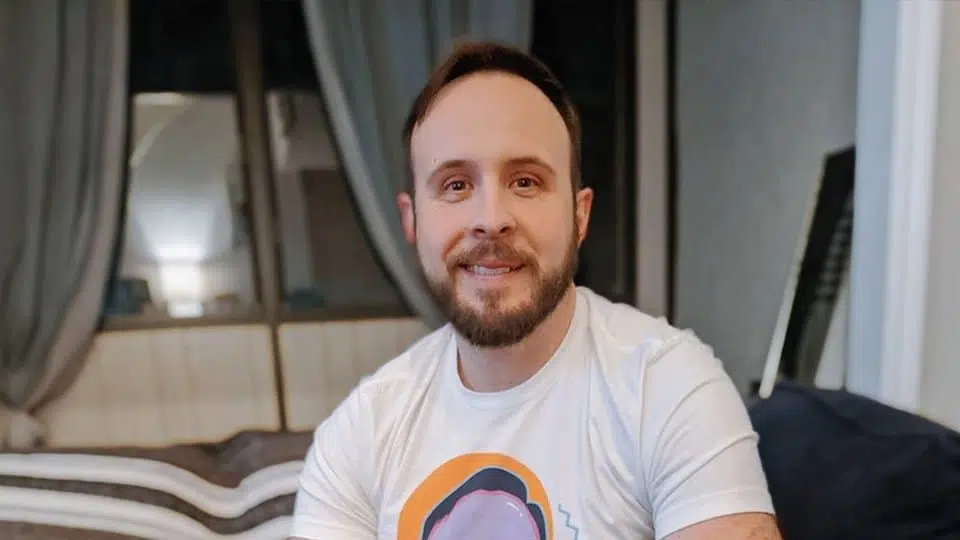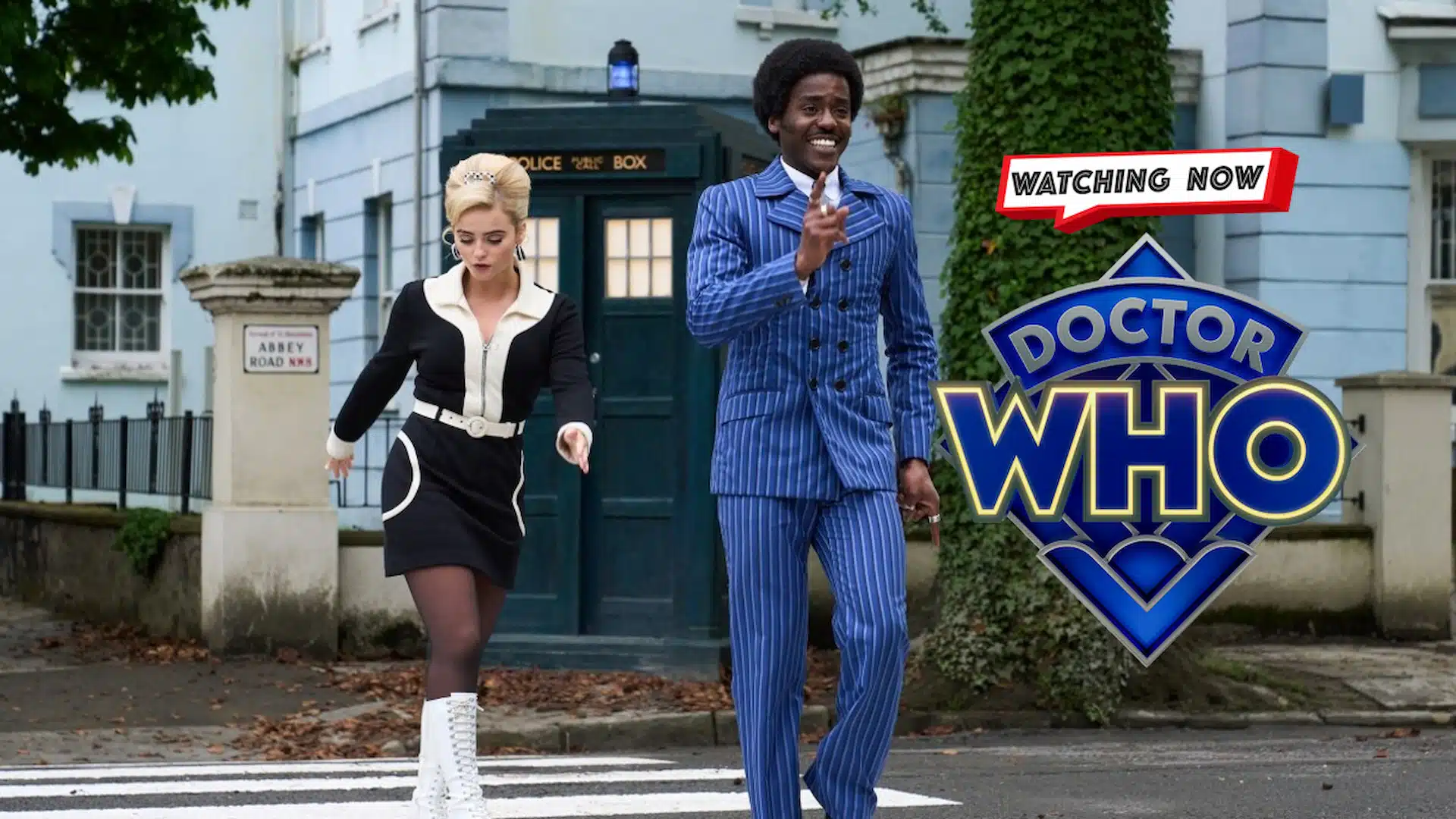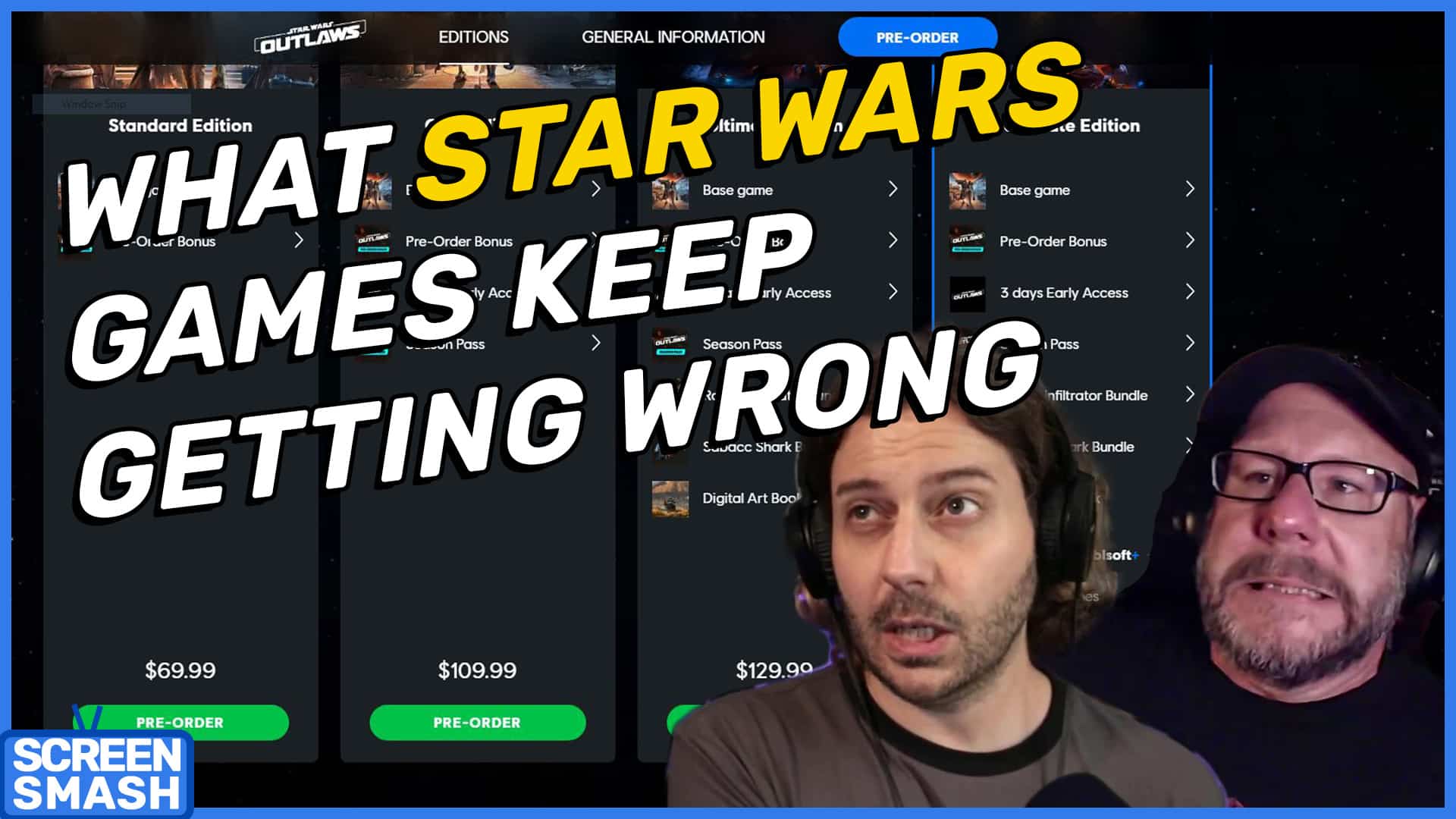
A few years ago, I came across a YouTube channel that showed up on my suggested feed. It was three guys who made fun of poorly made game titles like Chaser, Ride to Hell: Retribution, and SiN Episodes: Emergence. They created memorable characters while playing The Sims and made entertaining Grand Theft Auto V videos with their subscriber community. That channel was Inside Gaming. The same crew who ran this YouTube channel moved on to Rooster Teeth, started Funhaus, and helped relaunch Inside Gaming at Rooster Teeth.
Bruce Greene is a founding member of both Inside Gaming and Funhaus, and he now streams full-time on Twitch with multiple side projects in the works. I had the privilege of speaking with Bruce recently about his early career creating content, his gaming background, and everything in between.
You had a background in radio, and then you delved into G4. What was the path that led you to be a content creator?

Honestly, it’s been content creation since I bought a video camera off eBay when I was 15-16 years old and was running around with my friends shooting videos that were like Jackass, because we watched and we loved Jackass. We would go out and shoot those videos, and I would bring them home and edit them. And this was years before YouTube, so I would just edit them, show them to my friends, and didn’t do anything else with them. I was just sort of like, “Well, that was fun.”
Then I started being a radio DJ when I was 18. I created content on the radio for about five years. Then I moved to Los Angeles, got a job at G4, and was slowly creating content there in a lot of entry-level jobs. Eventually, I worked my way up to a producer role at G4, which took a few years. From there, I moved to Machinima and did the Inside Gaming stuff, then to Rooster Teeth with the Funhaus stuff. So I’ve been making content for 20 years. Long time.
Check out Bruce’s video on playing around with a potato gun with his friends:
What was that career moment that made you say, “I want to just take the leap into content creation.”? Or was that something that you’ve done since you started editing videos on your old camcorder?
So there isn’t really that moment, because, like I said, I’ve been doing it for a long time. And I bet I would be making my own YouTube videos even if I didn’t work in a content creation career. So I bet I’d have my own little YouTube channel to screw around on even if I wasn’t making YouTube videos and Twitch streams for a living.

But, back in 2004, I applied for a job at EA as a QA tester and for a job as a coordinator at G4. And they each called me on the same day, on my birthday, and said, “Hey, you got the job.” And I kind of knew that I had to make that decision then. I could either go into computer science and maybe into video game development, which is awesome and I would love to have done that. Or I could go into entertainment. I had done five years of radio at that point and enjoyed it, and I thought it seemed like the way to go, so I went with G4.
What would you say is your proudest career moment so far?
I worked very hard at G4 as a segment producer and as a coordinator, production assistant, and all sorts of entry-level jobs in addition to being a producer. And I always wanted to be on camera; I always wanted to create the content in addition to producing it. So when I left G4 to go to Machinima, that was my only thing. I was like, “Hey, I would love to come to Machinima. But I would like to be on camera. I’d like to be a producer and host.” And they said, “Done!”
And I’m proud that I was able to turn that into the job that I wanted because that was scary. Even in a tiny little network like G4, it wasn’t easy to get on the air. Not just anybody could be a host; it took a long time. So when I went to Machinima, I thought, “Alright, well, if they give me the chance, I will convert it into something that looks, hopefully, a success.” And I did. So I’m proud of that.

Do you have any mentors or other creators that you look up to?
In terms of on-camera mentors, Kevin Pereira was awesome, and he’s still a good friend of mine. I would watch him host his live show every day. And he was just so good at it. He’s been doing it for years, and he’s always a consummate professional. When I watched him, he never got frustrated or upset. He just did the job and did it well. And he’s also just a great guy.
So he wasn’t so much a mentor as somebody who I looked up to and I was like, “Man, that’s really cool. I’d love to do something like that.” I wanted to eventually get to that place in my career.
Let’s flip the script: What are some failures have you experienced, and what did you learn from them?
I don’t have a memorable failure so much as I have a bunch of little things I realized I’ll learn from. That’s the nice thing about YouTube and Twitch content: you could try anything. It’s not like you went and spent $3 million to make a movie and then it bombed. Instead, maybe you spent a couple hundred bucks on a Twitch setup, tried it, and nobody liked it. And you’re like, “Well, okay, I’ll move on.” So I’ve had a bunch of those things, and it’s a constant refining process.
It was also like that when I was running Funhaus in terms of the channel on YouTube. I was always refining the video to see what the audience liked. So if I put a video up, and it did better than I expected, I’d be like, “Oh, we can make another one.” And if it did worse than I expected, I’d be like, “Okay, never mind, we won’t make any more of those.”
So there’s a bunch of little failures and, in my opinion, they’re all just learning experiences. “Failure” is probably the wrong word. It’s more just something that doesn’t do as well as you wanted it to. And that happens all the time in content creation. I was constantly producing segments on Attack of the Show that didn’t air. I would spend hours, even days on segments, and the producers would say, “Nope, didn’t air.” Because that’s the way a live television show would go. So you don’t grow attached to it, you just think of it as no big deal and move on.
That’s a part of content creation: you’re constantly doing things that aren’t going to be great, and that’s okay. I honestly think that’s part of being an artist: making things that maybe people don’t like, maybe you don’t like, and you get better at your craft that way.

You mentioned ideas that don’t work. What factors would you say lead to content that didn’t quite work for you, like the animated show Sex Swing?
Those are things that we just wanted to try and we had the chance to try. There isn’t one particular thing that you can point to and say, “Oh well, it failed because of this.” That doesn’t happen. There’s a bunch of different things that lead up to why it did or didn’t “succeed” according to someone’s measure of success. There may have been a few people out there that really loved Sex Swing and still watch it. Who knows? But it just didn’t catch on and, again, it’s not not really about whether or not it was a success or a failure, just more of like, “Well, did it get enough eyes on it to warrant the cost?”
That’s what it always boils down to when it comes to productions: the money. And that’s okay, that’s not a big deal. I think this is something that I almost have a daily discussion about on Twitch, and it’s the same with YouTube, and television, and movies, and everything else that you listen to or watch or consume. If I make something on Twitch and it either doesn’t get a lot of subs or views (or both) or people or respond to it negatively, I have to take all of those into account and ask, “Do I want to do this again?”
And probably the answer is no. If two or three of those things aren’t met, if people didn’t like it or responded negatively in the chat, and a lot of people didn’t sub, I can’t do it again. And it’s the same with a movie or a television show: Netflix puts out 10 television shows a day, and, if people don’t watch it, Netflix doesn’t make anymore. That’s no big deal. That’s just part of it.

Speaking of going to Twitch, when did you start streaming?
I started streaming in general back in 2017, so about four years, and exclusively on Twitch since 2018. I streamed for a long time when I was at Funhaus as a second job, doing it three or four nights a week in addition to working at Rooster Teeth. When I left in 2019, that’s when I started doing it full-time.
What’s a myth that you want to debunk about streaming?
It’s the same myth that goes along with Funhaus: people asked, “Oh, you guys just sit down and make fun of games?” I thought, sarcastically, “Yes. That’s all we do. Right.” And it’s the same with Twitch: people ask, “Oh, you get on Twitch and you just play video games?” Oh, yeah. Sure. It’s just that easy.
I mean the answer is, “If you think it’s easy, go do it.” That’s always my thing: the coolest part about being like a YouTuber or Twitch content creator is that anyone can do it. So I challenge you to go and do it because, for me, that’s how you can debunk that myth for yourself of whether you’re “just sitting down with your friends making fun of video games for an hour” or “just playing a game for three or four hours on Twitch.”
No, it’s not that simple. There’s a lot of pre-production that goes into the things that I’m going to pick and play on Twitch. I have to think about how I think the audience will respond, how I’m responding to chat, how I’m responding to all the support that’s coming in, and what goals I want to hit in that stream or in that game. Or may I decide to do an entirely different stream, like a media share stream or a Pokemon card opening stream as a giveaway.
Those are all things that I have to plan out in my head, see how they play out, and then make sure I’ve got the resources for it during the stream. All the work that goes into the pre-production and production of Twitch streams takes a pretty long time. So each Twitch stream could involve 8, 9, or even 24 hours of work.

With YouTube, most of that work goes into the post-production. For YouTube content with Funhaus, we would sit down, write, and do maybe 8 hours of pre-production on something like picking a game to play. We’d probably have an idea of what section of the game we were going to play when we sat down and riffed on it. But then editing Funhaus videos took 5 days! So it was a lot of work on the post-production side for YouTube, and it’s a lot of work on the pre-production and production side for Twitch.
Going back a little bit in your career, how did you manage to ride that wave from radio to TV to new digital content?
Moving from radio to television at G4 was just changing mediums. That wasn’t me trying to stay ahead of anything, it was just more of like, “I’d like to work in television.” So I applied to a bunch of radio stations in LA like KROQ where I worked, and I applied to television stations and movies. I just knew I wanted to do something in entertainment, and those industries have existed for almost 100 years at this point.
But the transition from G4 to Machinima was scary because I didn’t know how people were making money on YouTube. I had no clue. I was watching Machinima videos in 2010 when I worked at G4 on television, and I knew that you could sell ads on a television show, and that’s how a television show made money. But I had no clue that that’s also how people made money on YouTube. Each time a person watches an ad, that content creator gets a penny. Then, if a bunch of people watch that video, it adds up. I was thinking that there’s no way that these people playing Call of Duty could get enough views and ads sold on those videos for people to make money. I was totally wrong. They were millionaires in the making right then.
Like that’s the craziest part of Twitch… people saying, “You know what, I like to watch this guy, I’ll throw him five bucks.”
I was really scared because I didn’t know how the business model worked. So it took a lot of research and time on YouTube before I thought, “Oh, I think I understand how this makes money.” So riding that wave from television to the internet to YouTube was mainly just a feeling I had because I had a lot of friends that were doing it there, a lot of friends who were going to the YouTube space and going to Machinima specifically. I thought, “There’s gotta be something over there. They’re hiring people. Like, what is it?” And I learned about it, I figured it out.
It was a little different going from YouTube to Twitch because I had already been doing it for a few years. I knew how it worked. It blew my mind, and it still blows my mind today how people directly give you support. That’s crazy to me. Like that’s the craziest part of Twitch: being on Twitch and people saying, “You know what, I like to watch this guy, I’ll throw him five bucks.” That’s fucking wild. YouTube didn’t have that: with a YouTube ad, you have to go through a bunch of, you know, soulless corporations to get your cash. Whereas Twitch income comes almost directly from the viewer: it goes through Amazon, and they take their cut, but the rest goes straight to you.
Let’s talk about gaming. What have you been playing on and off-stream? I know you recently did Pokemon Snap for 24 hours on Twitch. God bless you for doing that!
I beat the shit out of that game! I did. I literally beat it up and down. I beat the game and then I did all the Legendaries. I did all of it. So it’s all done. I never have to touch it again.
But in terms of games that I’ve been playing, that I enjoy, I’ve been playing Apex Legends a lot. They just came out with the new season and it’s awesome. I’ve also been playing Totally Accurate Battle Simulator, which sets up two AI armies controlled by a computer, and you tell it what army to fight against another army. Then, on Twitch, we have people bet on who’s gonna win. And it’s fucking awesome! So I’ve been playing that almost once a week. Plus, I’ve been playing a lot of Subnautica recently. Subnautica: Below Zero is an amazing single-player game that’s really fun. A lot of people like to watch and play on Twitch, too. And I’m getting ready for Battlefield 6, which I’ll hopefully be playing a ton of. I can’t wait. Very excited!

How would you say that gaming has changed over the years you’ve been playing?
I think the most obvious way gaming has changed is that people watch it now. Before you would just sit at home and watch your friends play or you play with your friends. And, of course, I’ve been playing games online for 20 years now. I bought my first gaming PC in 2001, and that’s had pretty obvious changes.
When I’m streaming a game, I’ll see a lot of people in chat say, “Oh, I’m glad you’re playing this. I wanted to see if I wanted it.” That’s something that didn’t exist 10 years ago, and now it totally does. Before, you only had reviews, and even then it’s like, “Ah, maybe the review is just all opinion-based.” Now you could just go on Twitch to watch any game you want, or any portion of the game, however you want to see it played, and it’s there.
Where do you see the future for gaming in, say, the next 5 years?

I’m kind of tunnel-vision on content creation for video games. But what I see in video games is something that’s already happening now, and I’ve done it a couple times on my channel: the audience will interact with the video game as you’re playing it. I control, but they interact. And it’s great! Developers are gonna be building that into video games in the next 5 years. They already are in games like Borderlands 3, which had a Twitch extension and integration that was built directly by Gearbox. I think it’s the coolest thing in the world when a bunch of people watching you can change the game that you’re playing.
In Borderlands, you connect the game to a Twitch account. Then, if you found a red crate with loot, like a specific gun, then the gun would drop for you in the game. Then it would select a number of people that had linked their account to your Twitch in Borderlands who would get the same gun that you saw. The game also had mini bosses occasionally, and the Twitch chat could take control of one of those mini-bosses. The mini-boss would move around with the AI, but the chat could pick what abilities that character would use against you.
Vermintide (a Warhammer game) is another really good example. Vermintide has constant audience votes on buffs, debuffs, enemy spawns, and stuff like that. The Twitch chat just votes on each thing, and, once they vote, it drops that enemy or buff or whatever in your game.
Check out the video below on how Vermintide can change a game with chat:
I recall you did Super Mario 64 with Crowd Control, and there are clips upon clips of you flubbing on certain parts of Mario 64.
So hard. It’s so hard. Crowd Control is different because people pay for it with bits. So the people pay to fuck with your game. And that’s why I like that a lot, too. Not only is it good for content, but it’s good for supporting the content creator.
My fellow Replayer Rohan Elliot wanted to ask what advice you have for streamers who are starting or who are on their journey and feel like they’re either being drowned out or being over-saturated with their content.
My main piece of advice is always the same: be consistent. If you can only do it once a week, pick a day in that week, and then do it every single week. If you’re doing it three times in, say, three weeks, and then the fourth time, you’re like, “Ah, nobody’s watching, I can’t do it,” don’t do that. The reason is because Twitch and YouTube have algorithms, and if you are not feeding those algorithms with content, you’re just gonna get bumped down further and further. The less consistent you are, the less those algorithms will help you, and the less people will help you because they won’t know how to rely on you.
So suppose everyone knows I stream on Sundays. Then after I stream on Sundays for six weeks in a row, I’m like, “Fuck it, I’m changing to Mondays.” Then after I do that for five weeks, I change to Wednesdays. At that point, no one knows what I’m doing, so it’s bad for my audience, and it’s bad for the algorithm. So be consistent.
“You gotta stay consistent.”
There’s another piece of advice that’s counter-intuitive: if you really enjoy content creation, then there are going to be times that you’re going to get on and you don’t want to do it. But that’s just part of it: if you want it to become your job, with aspirations of becoming a YouTuber or Twitch streamer, you have to power through that stuff. And you gotta do it when you don’t want to.
And I’m not saying don’t take a break. I’m not saying don’t take a vacation. I’m just saying that if you’re thinking, “You know what, I’m not feeling it today,” you’re gonna want to give into that feeling a lot. You gotta stay consistent. And that goes for everything in life. Imagine if you were doing a data entry job and decide, “You know what, fuck it. It’s Thursday. I don’t want to go, so I’m not going.” Your boss would say, “We have work that we need done. Where are you?” and you’re telling them, “I don’t want to go.” It don’t work that way! The same goes for content creators that have aspirations of making it their job.
If you just want to do it for fun, though, then fucking do it for fun! Stream whenever you want! Who cares? Because you don’t care, right? You don’t care about making money, you don’t care about turning it into your job. So just do whatever you want.
Check the video below for the latest clip show of Bruce’s streams:
Given your traditional backgrounds in producing, editing, and even camera and voiceover work, would you say that those help with someone who’s looking into that digital media industry?
It’s really up to you. That kind of stuff will help you, but you don’t need it. Twitch and YouTube are so bare-bones that as long as you got a webcam and microphone, you’re fine. And it’s more about whether or not you’re passionate about what you’re doing, and you like the content you’re creating, and if then the content is entertaining. So I don’t think you really need to worry about, “Oh, did I do voiceover?” or “Can I operate a camera?” or “Do I feel like I’m an actor?” Just try it! That’s, again, the best part of Twitch and YouTube: you can just try it. And if you don’t like it, then that’s okay, go try another form of content creation.
(Also see our article “Should I Start Streaming?”)
What would you like the Replayers to know about what you’ve been working on lately?

In terms of content that I’m pitching, we’re kind of slowly coming out of the COVID haze, and Lawrence Sonntag and I have been pitching a couple of shows here and there just that we hope get green-lit. Slowly productions are coming back to person-to-person stuff—COVID really threw a wrench in all that big time. We had a bunch of grand plans, and I was pitching stuff, and then Bang! everything shut down.
I’ve also been pitching to Twitch and a couple other places. But it’s funny, I don’t even talk about this stuff because I don’t like to talk about stuff that people will never see. One thing that I can talk about is Lawrence and I just started the Inside Games channel and we’re doing gaming news. We love it, and that’s just for fun, but I would love to make something bigger. Lawrence and I were just like, “You know what, screw it. Let’s just start it.” And that’s something new in addition to Twitch streaming and other stuff like that.
Thanks again to Bruce for the interview. Thanks also to Rohan Elliot for providing the supplemental questions and Dan Morris who helped facilitate the interview.
Where to follow and watch Bruce Greene:
Twitch: twitch.tv/BruceGreene
Twitter: @BruceGreene
Instagram: @BruceGreene
Inside Games (Bruce Greene and Lawrence Sonntag): youtube.com/InsideGames
Are you a Bruce Greene fan? What parts of Bruce’s career or advice resonate the most with you? Share your thoughts in the comments and let’s discuss.



